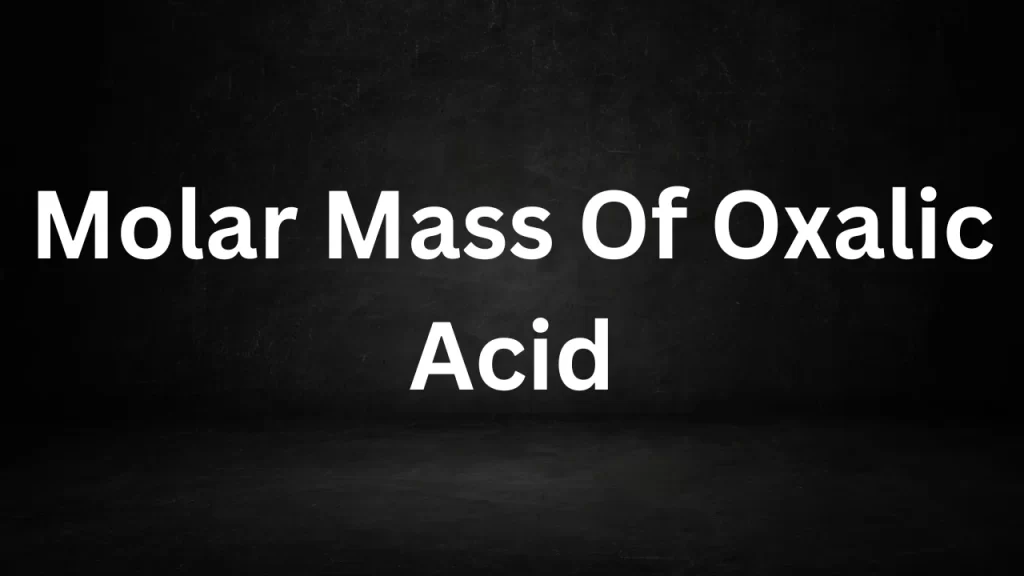Molar Mass Of Oxalic Acid
Molar Mass Of Oxalic Acid: The molar mass of oxalic acids, which has the chemical formula C2H2O4, can be calculated by summing the atomic masses of all the atoms in one mole of the compound. Here’s how you can calculate it:

Molar Mass Of Oxalic Acid
Calculating the Molar Mass of Oxalic Acid
To calculate the molar mass of oxalic acids (C2H2O4), we sum the atomic masses of its constituent elements:
- Carbon (C) has an atomic mass of approximately 12.01 g/mol.
- Hydrogen (H) has an atomic mass of approximately 1.01 g/mol.
- Oxygen (O) has an atomic mass of approximately 16.00 g/mol.
Now, let’s compute the molar mass of oxalic acid:
Molar Mass of Oxalic Acids (C2H2O4) = (2 × Atomic Mass of Carbon) + (2 × Atomic Mass of Hydrogen) + (4 × Atomic Mass of Oxygen)
Molar Mass of Oxalic Acids (C2H2O4) = (2 × 12.01 g/mol) + (2 × 1.01 g/mol) + (4 × 16.00 g/mol)
The Molar Mass of Oxalic Acids (C2H2O4) = 24.02 g/mol + 2.02 g/mol + 64.00 g/mol
Molar Mass of Oxalic Acids (C2H2O4) ≈ 90.04 g/mol
So, the molar mass of oxalic acids (C2H2O4) is approximately 90.04 grams per mole.
Significance of Oxalic Acid’s Molar Mass
Understanding the molar mass of oxalic acids is essential for various reasons:
- Chemical Reactions: Molar mass plays a pivotal role in stoichiometry, helping chemists determine the quantity of substances needed and produced in chemical reactions involving oxalic acids.
- Laboratory Procedures: In laboratories, chemists use molar mass to measure and prepare precise amounts of substances, ensuring accurate experiments and analyses.
- Solution Concentrations: Molar mass aids in calculating the concentration of oxalic acids solutions, which is crucial in fields like analytical chemistry and titration experiments.
- Industrial Applications: Oxalic acids finds application in various industries, including textile, metal polishing, and pharmaceuticals. Knowing its molar mass is essential for quality control and production processes.
- Safety Precautions: Understanding the molar mass of oxalic acids is vital for safety considerations in handling, storage, and transportation, as it helps assess potential hazards.
Conclusion
The molar mass of oxalic acids, approximately 90.04 g/mol, may seem like a mere numerical value, but it holds great importance in the realm of chemistry and scientific endeavors.
Read More
- ypes Of Chemical Bonding
- Chemistry In Everyday Life
- Energy Stored In A Capacitor
- Compound Lenses Thin Lenses In Contact
- 12th Class English Book Question Answer Pdf Download
Frequently Asked Questions (FAQs) Molar Mass Of Oxalic Acid
-
What is the molar mass of oxalic acid (C2H2O4)?
The molar mass of oxalic acids is approximately 90.04 grams per mole (g/mol).
-
Why is knowing the molar mass of oxalic acid important?
Knowing the molar mass of oxalic acids is crucial for various chemical calculations, including stoichiometry, determining solution concentrations, and conducting laboratory experiment. It is also essential for quality control in industrial applications involving oxalic acids.
-
How is the molar mass of oxalic acid calculated?
To calculate the molar mass of oxalic acids, sum the atomic masses of its constituent elements: carbon (C), hydrogen (H), and oxygen (O). Use the atomic masses of these elements and multiply them by the number of atoms of each element in the compound (as indicated by the chemical formula).
-
What is oxalic acid used for in industry?
Oxalic acids has various industrial applications. It is used in metal cleaning and polishing, textile processing, and as a reducing agent in chemical processes. It is also employed in pharmaceutical and research applications.
-
Is oxalic acid safe to handle?
Oxalic acids should be handled with care as it is toxic. Proper safety precautions, including the use of protective equipment and handling procedures, should be followed when working with oxalic acids to minimize health risks.